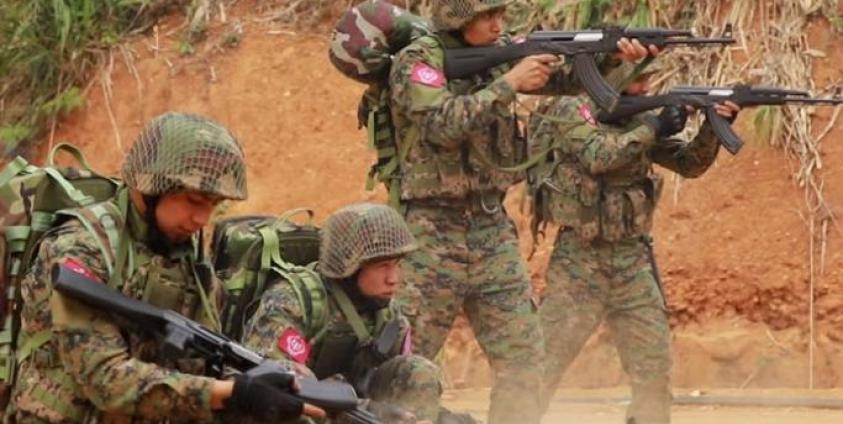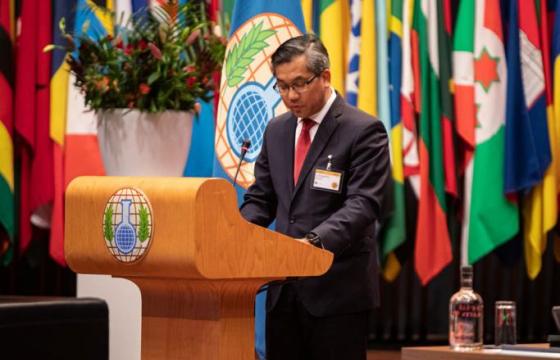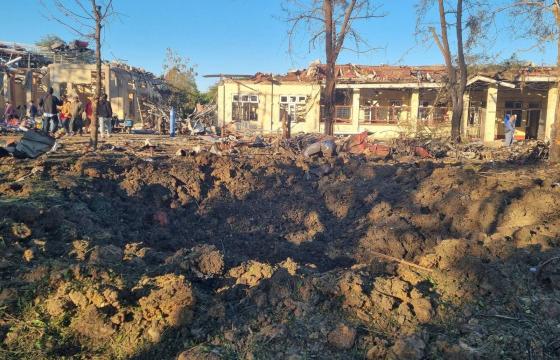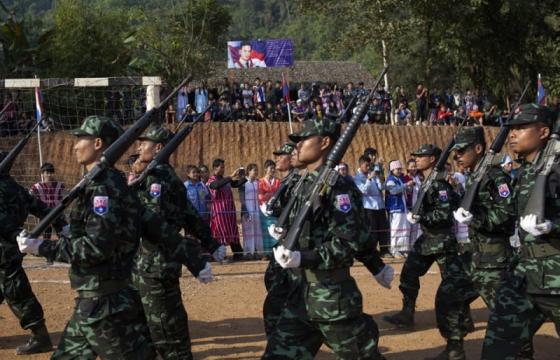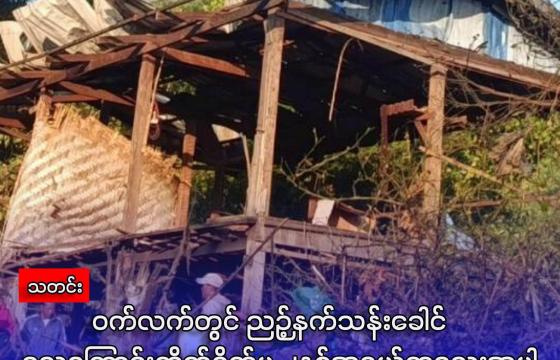Subir Bhaumik — In a strange rush to complete and operationalise the $484 million Kaladan Multimodal project, India risks getting sucked into what essentially is Myanmar's problem -- tackling an invigorated insurgency in the country's coastal province of Rahkine (previously Arakan).
Policy analysts familiar with Myanmar advise caution because the Arakan Army (AA), formed in 2009 in the northern state of Kachin, is no throwaway. Myanmar watcher Bertil Lintner thinks the AA is a ' new age rebel group " unlike territory holding Kachins and Karen fighters, and its calculated offensive against the Tatmadaw in both rural and urban areas has significantly weakened the state"s grip on the strategic Rakhine province, where both China and India have initiated major connectivity projects.
The Chinese have finished the Kyaukphyu deep seaport and are going ahead with a Special Economic Zone around it with rail-road and oil-gas pipelines linking it with Yunnan province. The Indians have renovated the Sittwe port and is seeking to use it to connect to Mizoram province through the Kaladan river. The Myanmar military suspects the AA is trying to create a liberated zone with a strong base in Rakhine in keeping with its bid to free Rakhine of Burmese control.
But analysts say the Burmese army appears unable to curb the Arakan Army, which has 7000-8000 well-armed fighters trained by the Kachins. "The Arakan Army is pursuing a different kind of warfare, it is not trying to hold territory so far, it hits the Tatmadaw hard and then just vanishes, the Burmese troops have no answer to this highly mobile warfare," says Bertil Lintner.
That the Arakan Army is no throwaway weighs heavy on Indian military planners -- they want to back the Tatmadaw to regain control over the rebels in Rakhine so that the Kaladan project is completed and operational but they don't want to get too deeply involved to avoid Arakan Army retaliation.
"We should stay away from the Rakhine muddle, surely we should not get involved militarily, much as the Myanmar army Tatmadaw wants us to," says military analyst John Mukherjee.
Mukherjee, a retired lieutenant general and a former chief of staff of India's eastern army heads the Calcutta-based security affairs think tank CENERS-K, which counts former army chief General Shankar Raychoudhuri and former Indian Air Force chief Arup Raha among its patrons and office-bearers.
"The project is important for India, especially for its remote Mizoram state, but it is not something for which we should get militarily involved in fighting the Arakan Army rebels," Mukherjee told this writer recently.
After years of delay, India finally kicked off the construction of the 109-km road project that connects Paletwa river terminal to Zorinpui on the Mizoram border in Myanmar in 2018. But work on this phase of the project has been tortuously slow, one reason being the Arakan Army's constant disruptions by kidnapping workers involved with the road and bridge construction.
The ₹1,600-crore road project that passes through dense forests and hilly areas was awarded to Delhi-based C&C Constructions in June 2017. But the contractor had to wait till January 2018 for the requisite clearances from the Myanmar government to start groundwork.
The company lobbied for strong military action and the Indian army conducted Operation Sunrise last year to demolish the Arakan Army's bases in southern Mizoram. The Indian army formally accepted in a press statement that the operation was necessary to tackle the Arakan Army which has 'emerged as a threat to the Kaladan project."
On completion, the project will help connect Mizoram with Sittwe Port in Rakhine State of Myanmar. The project was undertaken as sea-land access to Northeast when Bangladesh under then PM Khaleda Zia was not playing ball. But now with the Hasina government agreeing to multi-modal transit to northeast India through Bangladesh territory (road, rail, sea), the Kaladan project is not so important anymore, except for landlocked Mizoram state. " It is not something which calls for military intervention," says Myanmar watcher Binoda Mishra of the Centre for Studies in International Relations & Development (CSIRD). " We should learn to balance, to hunt with the hound and swim with the crocodile."
India has already completed the rest of the Kaladan project work in Myanmar. This includes the construction of the Sittwe Port on Lakadan river mouth in Rakhine, construction of a river terminal 158 upstream at Paletwa and dredging of the Kaladan river.
On the Indian side, work is on to extend the Aizawl-Saiha National Highway by 90 km to the international border at Zorinpui. Also, a ₹6,000-crore project is underway for four-lane the 300-km highway from the Myanmar border to Aizawl to ensure the faster movement of goods.
Completion of the Paletwa-Zorinpui road, therefore, holds the key to operationalise the Kaladan multi-modal project.
But after Operation Sunrise, the Arakan Army has attacked Indian interests more regularly than ever before. In Nov last year, five Indian workers and four local workers involved with the Kaladan road project were kidnapped, along with an NLD MP in the Chin state. Mizoram chief minister Zoramthanga. a former rebel leader with extensive contacts among the rebel groups on India-Myanmar border played a key role in getting the workers and the MP released but one of the workers died in captivity. A similar incident of abduction of local workers involved with the Kaladan project took place in March last year. The Arakan Army rebels also set ablaze a civilian vessel carrying 300 steel frames for the Paletwa bridge and the crew were abducted. That perhaps influenced India to undertake Operation Sunrise in close coordination with the Burmese Tatmadaw but instead of cowing down, that seems to have provoked the Arakan Army.
AA spokesman U Khaing Thukkha recently told Burmese media that 'China recognises us but India doesn't". Analysts like Vivekananda International Foundation's Jaideep Chanda interpret that as India's refusal to pay up as upsetting the Arakan Army, which, he feels, China may have already done to ensure there is no disruption for its Kyaukphyu deep seaport and SEZ project. Initially, that project was pitched at $6 billion but has now been scaled down to below $ 2 billion because Myanmar fears unsustainable debt burden.
"In Myanmar, China maintains fine relations with both the federal government and the Tatmadaw and also with rebel groups, especially those in the Northern Alliance. It is an open secret and widely reported in the media that it has armed the Wa and Kokang groups. Chinese agencies may have already paid the Arakan Army," Chanda told Southasian Monitor.
There is no evidence of Chinese assistance to the Arakan Army but the fact that the Chinese project at Kyaukphyu has not been disturbed and the Indian Kaladan project has raises suspicions.
'We should follow the Chinese model of playing all sides rather than get dragged into the Rakhine conflict by the Burmese military," said John Mukherjee.
The Tatmadaw has recently requested the Indian army to provide it passage through some strategic corridors in southern Mizoram. That has raised eyebrows in Delhi.
The lessons of getting dragged into Sri Lanka's Tamil conflict weighs heavy on India, especially its army. The Indian Peace Keeping Force not only suffered many losses in Jaffna but also that provoked the Tamil Tigers, once backed by India, to attack and kill former PM Rajiv Gandhi.
Mizoram chief minister Zoramthanga recently told this writer that he has asked PM Modi and foreign minister S.Jaishanker to appoint a new contractor for the Kaladan project because C&C has gone bankrupt. " They (C&C) have no idea how to do business in this area. Rakhine is not Indian territory and the Indian army can't do much. I have asked Delhi to appoint a new contractor who can then be properly advised," Zoramthanga told this writer, hinting that the new contractor can be put in touch with the Arakan Army and could pay up to buy peace.
The Arakan Army has maintained it is not against trans-national projects in Rakhine, provided they "recognise" AA and don't cooperate with the Burmese military. Zoramthanga, a former rebel leader who now helps Modi bring other northeastern rebel groups to the table, is clearly against any Indian military adventure in Rakhine. He would much rather use his influence with the AA to get the Kaladan project, so important for his Mizoram state, completed without a fuss. But such a course risks upsetting the Burmese, especially its all-powerful military.
Stretched in counter-insurgency duties in Kashmir and Northeast and having to stand guard over the long borders with China and Pakistan, the Indian army can ill afford getting dragged into the Rakhine muddle by wily Burmese generals like it got dragged into Jaffna by a shrewd Sri Lankan president Jayawardene. The million-dollar question before India now is whether it can develop its Myanmar policy entirely on good relations with the ruling regime and the military or it will consider reverting to the 1987-96 policy of "selective relationships" with rebel groups like Kachin Independence Army (KIA) or National Unity Party of Arakan (NUPA) to protect its interests on the borders which the Myanmar military has failed to control. With someone like Zoramthanga (who admits to having played some role in the Burmese peace process in pre-Suu Kyi era) around, India could consider a role in bringing the AA and the Burmese military to the table.
But the Tatmadaw's intensified operations in Rakhine and Chin despite the COVID pandemic makes any peace effort difficult, if not impossible. The Tatmadaw, fresh from its legislative victory in its stymying NLD's parliament bills for greater democratisation, is likely to pursue fighting not only in Rakhine and Chin but also in Kachin and Shan states. Continuous counter-insurgency operations, despite much losses, is crucial to the Tatmadaw's desperate effort to retain relevance and gain popular support as the saviour of Myanmar. But that is killing Aung San Suu Kyi's 'second Panglong' initiative to initiate a nationwide dialogue with ethnic minorities and rebels representing them following her late father's vision of a federal and inclusive Burma.
(Subir Bhaumik is a former BBC correspondent, author, and regular Mizzima contributor)

